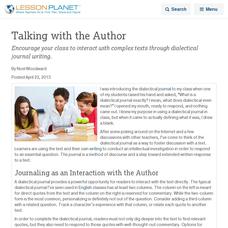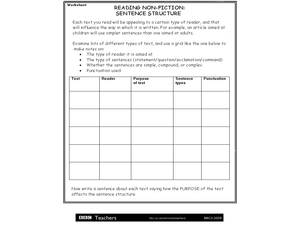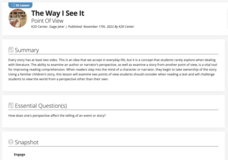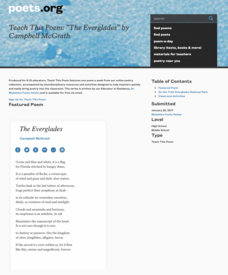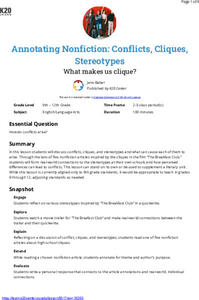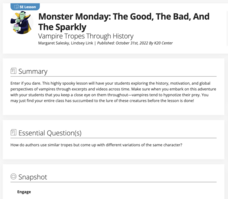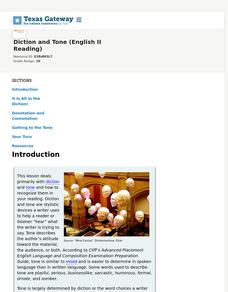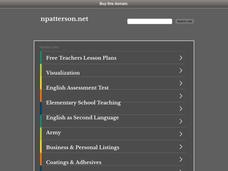Curated OER
Talking with the Author
Encourage your class to interact with complex texts through dialectical journal writing.
E Reading Worksheets
Tone Worksheet 2
The beauty of a poem is lost without an understanding of its tone. Middle schoolers connect author's purpose and word choice to four poems in a literary analysis activity, which prompts them to note each poem's tone and meaning.
Star Wars in the Classroom
"Shakespeare and Star Wars": Lesson Plan Day 3
To make the point that there are many forms of language, each with its own purpose, class members select 10 lines from Doescher's play, translate these lines first into contemporary English and then into "SMS/Tweet."
Star Wars in the Classroom
"Shakespeare and Star Wars": Lesson Plan Day 1
"Now is the summer of our happiness/Made winter by this sudden, fierce attack!" Luke Skywalker meets Hamlet in a 10-lesson unit based on Ian Doescher's William Shakespeare's Star Wars: Verily, a New Hope. Using Star Wars® as source...
Curated OER
Reading Non-Fiction: Sentence Structure
Use this worksheet to help make explicit the connection between sentence structure, audience, and author's purpose. Readers track and find patterns in sentence structure in various nonfiction texts, and connect it to the purpose of the...
Penguin Books
A Teacher's Guide to the Signet Classic Edition of The Crucible by Arthur Miller
A 20-page guide is a must-have for any instructor, seasoned veteran, or first year-teacher, using Arthur Miller's The Crucible as an anchor text. The guide begins with extensive background information about Miller and the McCarthy era...
K20 LEARN
To Ban or Not to Ban? Intellectual Rights and Responsibilities: Banned Books, Censorship Part 2
After examining different perspectives on book banning, scholars select a book from a list of frequently banned books and research the controversies surrounding it. They then craft an argument about their chosen book, including arguments...
C3 Teachers
Black Women Writers: What Gets Black Women Heard?
Zora Neal Hurston, Toni Morrison, and Maya Angelou are featured in a guided inquiry unit. High schoolers research the lives and works of these and other Black women writers and craft an argument, using evidence from their research, to...
Digital Public Library of America
A Raisin in the Sun by Lorraine Hansberry
A set of 14 primary sources provides background for a study of Lorraine Hansberry's drama, A Raisin in the Sun. Featured are images from stage productions of the play, white supremacy protests, a clip from a television interview, and...
K20 LEARN
The Way I See It: Point of View
Robbers see a house from a different perspective than real estate agents. That's the big idea in a lesson about point of view. Groups assume the role of either robbers or real estate agents, note important details in a description of a...
EngageNY
Grade 10 ELA Module 4: Unit 2, Lesson 15
What goes around, comes around. Using the resource, pupils read Act 4.3 of Macbeth, in which Macduff and Malcolm plan to attack Macbeth. Scholars then hold a discussion and complete writing activities to analyze Shakespeare's structural...
Digital Public Library of America
The Watsons Go To Birmingham—1963 by Christopher Paul Curtis
A primary source set of photographs, videos, newspaper articles, and FBI reports provides insight into race relations during the 1960s, the Sixteenth Street Baptist Church bombing, and the murder of Emmitt Till. Designed to be used to...
Digital Public Library of America
Beloved by Toni Morrison
Any classroom study of Toni Morrison's Pulitzer Prize-winning novel Beloved requires careful planning and scaffolding. A primary source set that includes a video, illustrations, photos of artifacts, and a broadside of the Fugitive Slave...
Academy of American Poets
Teach This Poem: "Tuesday 9/11/01" by Lucille Clifton
A photograph and a poem remind young people of the events of November 11, 2001. After examining Andrea Booher's photograph taken on September 13, 2001, and reading Lucille Clifton's poem "Tuesday 9/11/01", scholars compare their...
Academy of American Poets
Teach This Poem: “The Everglades” by Campbell McGrath
Florida's Everglades come alive for young environmental scientists as they watch a video taken in the park and read a poem about the watery paradise. After a careful study of the two resources, class members consider the function of the...
Penguin Books
Teacher's Guide: When the Emperor Was Divine by Julie Otsuka
Julie Otsuka's haunting novel, When the Emperor Was Devine, is the subject of a 14-page teacher's guide. The guide includes the text of an interview with Otsuka, background information about Japanese immigration to the United States, and...
K20 LEARN
Annotating Nonfiction - Conflicts, Cliques, Stereotypes: What Makes Us Clique?
John Hughes' The Breakfast Club takes center stage in a instructional activity about annotating nonfiction texts to keep track of evidence that may be used later in discussions and writings. Scholars consider the stereotypes and...
K20 LEARN
"The Lady, Or The Tiger?" Which Do You Choose?: Internal and External Conflict
"How come there's no ending?" After a close reading of Frank R. Stockton's tale "The Lady, or the Tiger?" in which scholars examine each of the main characters' conflicts and motivations, writers craft their own ending using textual...
K20 LEARN
That Which We Call a Rose: Connotation and Denotation in Romeo and Juliet
Words carry weight. And some words carry baggage. Scholars learn the difference in a study of connotation and denotation. Individuals sort the cards into three groupings using words from Shakespeare's play. After sharing within groups,...
K20 LEARN
It’s Never Too Late to Apologize: Character Development and Theme in “The Scarlet Ibis”
Sometimes saying I'm sorry just doesn't cut it. Scholars examine a series of apology poems, songs, and stories and consider each speaker's regrets. Using what they have learned, they analyze James Hurst's short story, "The Scarlet Ibis,"...
K20 LEARN
Monster Monday - The Good, the Bad, and the Sparkly: Vampire Tropes through History
Fangs, capes, pale skin, and beady eyes! High schoolers investigate the tropes associated with vampires by examining excerpts from stories and films. They then create a timeline that reveals how the depictions of vampires have evolved...
Texas Education Agency (TEA)
Syntax (English II Reading)
Lesson five in the series focuses on syntax and the elements that make sentences enjoyable. Learners practice building different clauses and phrases and using figures of speech and rhetorical and literary devices.
Texas Education Agency (TEA)
Diction and Tone (English II Reading)
Words carry baggage. In addition to their literal, denotative meaning, words also carry the weight of the associations and connotations attached to the word—the connotations of words writers use to create the tone of a piece. An...
Curated OER
Reading Response Questions
In this readers response worksheet, students are posed 37 questions in response to a passage they've read. Students must write short responses to each thought provoking question regarding characters, events, and author's purpose among...
Other popular searches
- Authors Purpose Powerpoint
- Authors Purpose Mini Lesson
- Authors Purpose Passage
- Teaching Author's Purpose
- Main Idea Authors Purpose
- Teaching Authors Purpose
- Authors Purpose Persuade
- Authors Purpose for Writing
- Identify Authors Purpose
- Author's Purpose to Inform
- Authors Purpose to Entertain
- Identifying Author's Purpose


